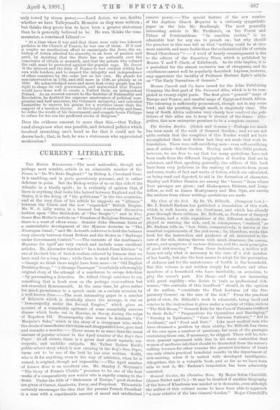CURRENT LITERATURE.
THE Mngon MAGAZINEB.—The most noticeable, though not perhaps most notable, article in an admirable number of the Forum is "Do We Hate England ?" by Bishop A. Cleveland Coxe. It is rambling, and in parts garrulously personal, and is rather deficient in point. But the Bishop writes of us on this side of the Atlantic in a kindly spirit ; he is evidently of opinion that, if there is anything that looks like hatred between England and the States, it is the doing of "the politicians" in the two countries; and at the very close of his article ho suggests an " alliance " between the Union and the now "expanded" British Empire. Mr. W. S. Lilly writes in a learned but somewhat discursive fashion upon "The Shibboleth of The People ' ; " and in Pro- fessor Max Mailer's article on "Freedom of Religious Discussion," there is a want of elbow-room. Senator John Sherman hints at a materialistic development of the Monroe doctrine in "The Nicaragua Canal ; " and Mr. Acworth contrives to hold the balance very cleverly between Great Britain and the States in "Railways sander Government Control."—The contents of the Gentleman's Magazine for April. are very varied, and include some excellent articles. Mr. Alexander Gordon's "In a Scotch Farm Kitchen "is one of the best bits of Scotch realism relieved by humour that we have read for a long time ; while there is much that is attractive —though we think there might have been more "Old English Drinking-Songs." "A Strange Passenger" is certainly a thoroughly original story of the attempt of a murderess to escape detection —by personating a detective. Dr. Alfred Crespi contrives to say something that is fresh even on the perhaps over-written but not overrated Bournemouth. At the same time, he gives rather too much prominence to a speech made on a certain occasion by a well-known Peer.—The most interesting paper in a number of Belgravia which is decidedly above the average, is one on " Demonopa.thy under the Second Empire," which gives an account of a remarkable epidemic of some essentially nervous disease which broke out in Morzine, in Savoy, during the reign of Napoleon III. Demonopathy also seems to dominate "For Marjorie's Sake," which is the story of a clergyman who, under -the strain of immoderate Calvinism and disappointed love, goes mad and commits a mural:sr.—There seems to us more than the usual amount of popular science in the April number of the Boy's Own Paper. At all events, there is a groat deal about aquaria, seas serpents, and suchlike subjects. Mr. Talbot Baines Reed's Public-school story which is now running in the Boy's Own Paper, turns out to be one of the best he has ever written. RoMt, who is fit for anything, even in the way of athletics, when he is roused, is original, though not impossible.—The April number -of Leisure Hour is an excellent one. Mr. Stanley .1. Weyman's "The Story of Francis Cludde " promises to be one of the best works of a comparatively new writer who is rapidly coming to the front. Under the title of "Statesmen of Europe," good sketches are given of Carnet, Gambetta, Ferry, and Freycinet. This article .certainly encourages the idea that the present French President is a man with a considerable amount of moral and intellectual reserve power.—The special feature of the new number of the Aug/jean Church Magazine is a curiously sympathetic paper on the late Mr. Bradlaugh. The most generally interesting article is Mr. Prothero's, on the Forest and Palace of Fontainebleau. "In omnibus caritas," is an admirable text for any one to preach on ; but why should the preacher in this case tell us that "nothing could be at once more amiable and more feeble than the ecclesiastical life of certain Broad Churchmen" P —A word of hearty encouragement is due to the editors of the Expository Times, which is published by Messrs. T. and T. Clark, of Edinburgh. As its title implies, it is a periodical for the almost exclusive use of clergymen, and its excellences cannot well be popularly described. Laymen, however, may appreciate the lucidity of Professor Herbert Ryle's article on "The Early Narratives of Genesis."






































 Previous page
Previous page